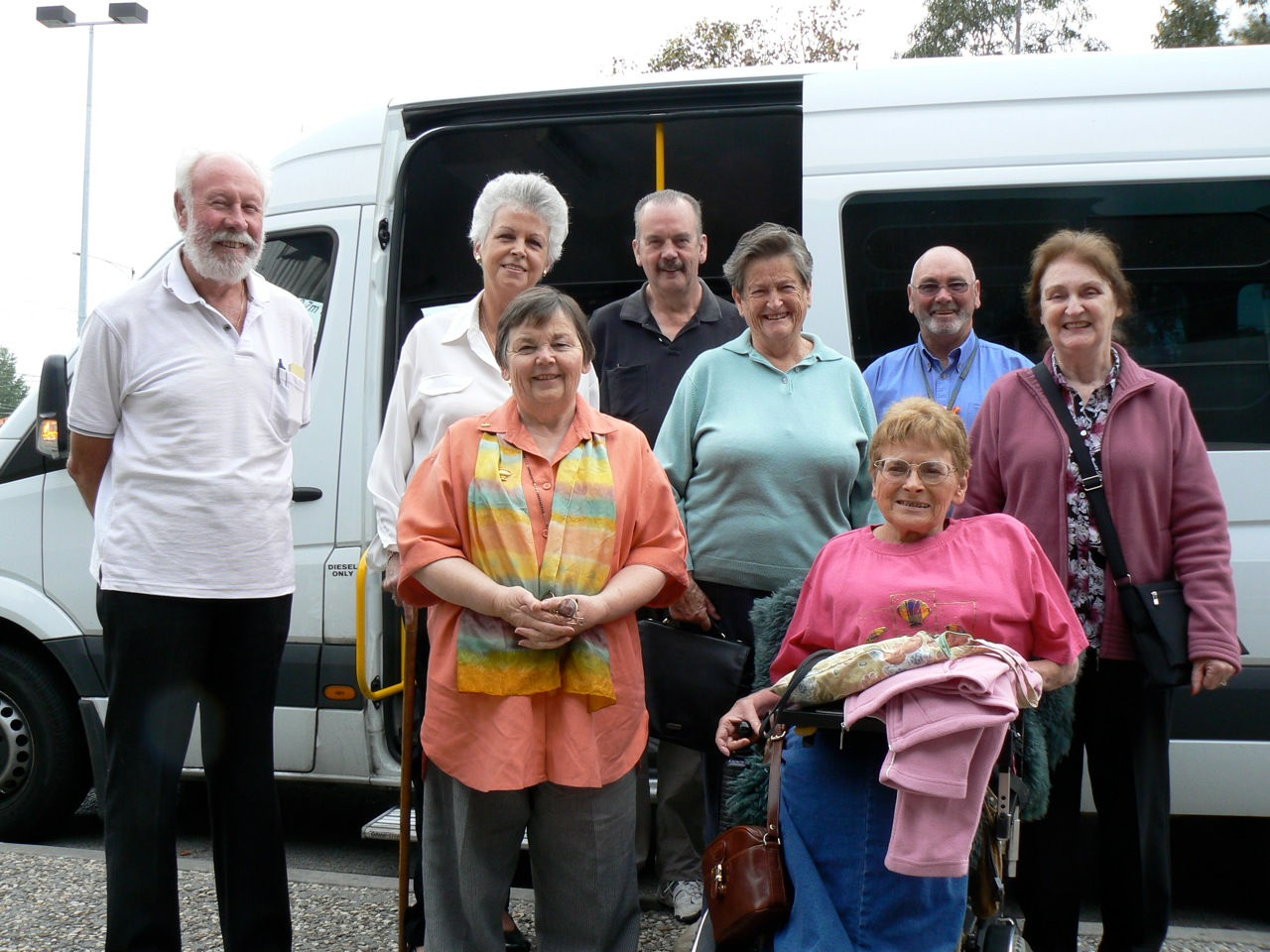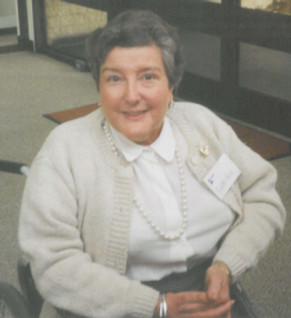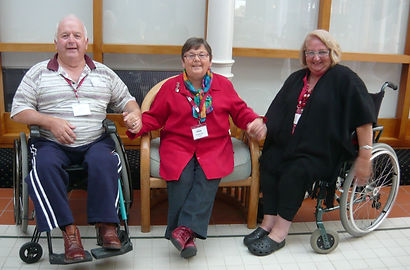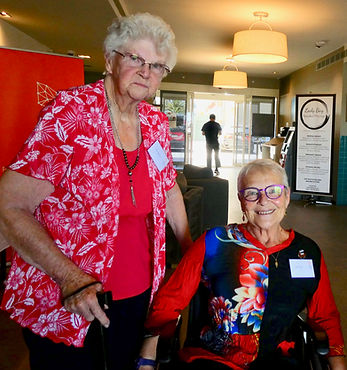

polio
network
victoria
BORN OF NECESSITY
A desire for social justice for people with a disability saw in 1989 the birth of support for people with polio

This story has to begin with Edith Hall AM...
Edith (pictured right) had a strong and active commitment to social justice for people with disability and she championed women’s rights. From 1982-89, Edith was the Executive Officer of Independence Australia (formerly Paraplegic and Quadriplegic Association of Victoria, founded in 1957). She had polio in 1937 and was acutely aware that nothing was being done in Australia for polio survivors.
To redress the lack of information and rehabilitation, she decided in 1987 to attend the fourth Polio Survivors Conference in St Louis Missouri, USA. Edith Hall brought back books, leaflets papers, audio and videotapes. The Board of Paraquad was sympathetic to establishing a polio network, so she held a public meeting. “I could not believe it,” she said when interviewed in 1997, “on a Sunday [October 18, 1987] in Camberwell and 125 people turned up”.
Beth Brodribb, who had been working with ParaQuad’s sheltered workshop, was asked to help with the network.Beth was given 30 names of polio survivors and the network grew quickly. Her job was to gather and disperse information. Copies of material Edith brought back were sent inter- state in the cope of encouraging establishment of self-help groups all over Australia.
Within a year networks of polio survivors were formed in each state and territory. In Victoria, Beth had managed to contact 400 polio survivors, publish the first issue of a newsletter and organize a seminar that attracted people from all over the country.
The aim of the seminar was to discuss the needs of post polio survivors and to share information. Recommendations from the seminar were taken up with the Health Department.
In 1989 the network changed its name to the Australian Polio Network and began a social program for member, numbering well over 500. Beth Brodribb went to St Louis for an international polio conference and also visited the British Polio Fellowship in the UK. Like Edith, she returned with valuable resources and information.
One of the issues the network had to tackle was educating health professionals about the late effects of polio. In 1990 the Department of Community Services approved a small amount of funding for 12 months. This was used to produce and mail the network’s newsletter, which had become a valuable medium on the latest worldwide re- search and information. Kits were also provided and visits made to polio networks interstate.

SEMINAR 1990
Because of the demand from interstate groups, a seminar was held in 1990 attended by 100 people. Many expressed anger and concern at the lack of appreciation of polio survivors and their needs by the medical and paramedical professions.
“We had to teach the doctors. It was an uphill battle... one doctor even wrote an article to the newsletter belitling post polio syndrome,” Beth said in interview in 1997. This need to target health professionals led to a symposium held in April 1991 in conjunction with Datech Expo ’91. Health professionals came to learn from the new group, generating more enquiries.
Not all health professionals were unaware of the needs of polio survivors and a post polio clinic was set up at Bethesda Hospital with a post polio advisory unit in mid 1991. This was run by Dr Peter Colville, who first conducted clinics from the Multiple Sclerosis Society, then out of Fairfield Infectious Diseases Hospital. Dr Colville, AM, who died in 2011, was also a polio survivor.
At the 1991 symposium, a federation of state networks was formed, called Polio Australasia, providing resources for new interstate groups. This group faded but in 2007 at a think tank in Sydney, moves were made to form Polio Australia. Polio Australia has been unsuccessful in attracting federal funding but has been supported by the Balnaves Foundation. PA runs annual retreats aiming to provide nationally consistent information to survivors and health professionals.
Support groups were also forming in regional Victoria – at Geelong, Essendon, later in the East and on the Mornington Peninsula.
In 1995 the Network name was changed to the Australian Polio Network (Vic) then to Polio Network Victoria. In 1994 there were two community officers (polio) based at ParaQuad, whose role was to help set up groups in areas without access to groups; to promote polio immunisation; to raise awareness of needs; to organize workshops; and provide guest speakers to community groups and schools.
In 1996 the first Polio Day was held at Ballarat attracting more than 100 people, including representatives from 13 of the 15 support groups. The focus of the day was social. Many survivors met people they hadn’t seen for decades. This was such a success, it was decided to run one annually. On December 23, 1999, ParaQuad Victoria cancelled a planned Polio 2000 Conference less than a month before it was due to commence. Following networking between the Australian and New Zealand Polio Networks, and despite losing inter-national speakers, the conference went ahead on January 19 -21, under the auspices of Polio Australasia (the collective Australasian Networks) and with the support of PNV. Valuable papers were presented, some still in circulation.

SUPPORT GROUPS
In 2012 there were 15 polio support groups across Victorian metropolitan and country areas. Local members according to each group’s needs run the groups. The Polio Community Officer was in regular contact with PSG co-ordinators and visited each PSG on a rolling schedule throughout the year. They generally offered:
• offer mutual support to people who have had polio, their families and carers.
• provide an opportunity for people who have had polio to meet socially to exchange information and share ideas.
• identify and lobby local agencies and organisations on the needs and rights of people with disabilities.
In 1991 an advisory committee to the Polio Community Officer position within the Community Support Services Branch of PQV was formed. Called the Polio Advisory Committee (PAC) members were elected from members of PNV. Over the years these were just some of its achievements:
• Information booklet for Polios
• Information booklet for Clinical Services Providers
• Brochure for Attendant Carers
• Collection of information sheets on important topics, e.g. anaesthesia. • PNV website
• Entry of June Middleton in Guiness World Records
• Making of “The Australian Experience” DVD
• Ongoing input regarding disability parking and taxi issues
• Information and support to assist support groups
• Supported establishment of Polio Australia
• Several surveys regarding Polio related issues
• PNV promotional posters
• Keeping the network together
• Participation in the 2000 Polio Australasia conference
• Two trips to Parliament House (state) to put our case to both sides.
• Good information kits - ongoing
• Guest Speakers to schools etc
• Polio Days every year.
In 2011 following the annual meeting of convenors of the support groups it was decided to make membership of the advisory group regionally based and to bring it into line with the Client Reference Group of Independence Australia (as ParaQuad became named in 2008). It is now known as the Polio Network Victoria committee.
In the same year Edith Hall died aged 77 years. She was a life member of the Board of National Disability Services (then called ACROD) for more than 10 years, first as Chairman of the Victorian Division, then as three-time elected member. Edith also chaired NDS’s National Committee on Women’s Issues for five years. Her NDS work took her overseas as Australia’s Delegate at the United Nations’ End of Decade for Women Conference in Nairobi and at two UN Rehabilitation International Conferences. Her many positions held in Victoria included President of Yooralla and President of the Dis- abled Motorists Association of Victoria. She was a member of the first Planning Committee of Melbourne City Council’s Access Committee and a member of the Institute of Architects Access Committee. She was President of the Non-Government Agencies Committee on Access Victoria.
Nationally her involvements included Deputy Chairperson of the National Committee of Non-Government Organisations for International Year of the Disabled 1980-82 and Convener of the Commonwealth Government’s National Women’s Consultative Council 1984. She was a Founding Governor of the Bicentenary Youth Foundation; and a member of the Social Security Advisory Committee Edith was a Member of the Order of Australia for service to the community, particularly to people with disabilities.
In 2019, owing to changes in State Government funding, PNV has been forced to 'go it alone'. We have become incorporated under the chairpersonship of Bev Watson, supported by an energetic committee. The aim continues to be to support the support groups, find polio survivors who have not come forward and provide them with the information they need to deal with the late effects of polio. The committee also will continue to stage an annual Polio Day, alternating between metropolitan and regional centres to give polios, family members, and carers, the opportunity to catch up and hear guest speakers on subjects of most importance to the ability of everyone to remain independent.
–Fran Henke, updated from Iron Wills – Victorian Polio Survivors' Stories